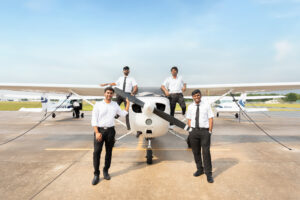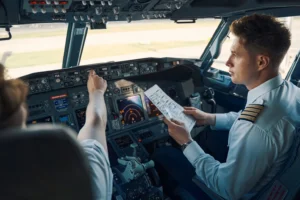Choosing the correct flight school is an important step toward becoming a pilot. With so many options available, how do you know which one will best suit your needs and help you achieve your aviation goals? Consider queries like, “What is the school’s track record for student success?” Do they provide the precise type of training you require? What types of assistance services do they offer? In this blog, we’ll look at important topics like accreditation, program offerings, pricing, and instructor qualifications. By the conclusion, you’ll have the knowledge to choose a flying school that properly matches your goals.
The Flight Training Journey

Flight training is given by specialized institutions; aspirants seeking to be pilots attend this education. These schools offer all kinds of programs and classes, designed to give students the necessary scientific knowledge and skills. Flight schools offer instruction for all types of pilot certificates, from Private Pilot License (PPL) to Commercial Pilot License (CPL), as well as instrument and multi-engine ratings
1. Ground School: This is the foundation of your aviation knowledge. You’ll delve into the science of flight, covering topics like aerodynamics, meteorology, navigation, aircraft systems, and regulations. Expect a combination of classroom instruction, self-study materials, and written exams.
2. Flight Training: Now comes the exciting part – putting theory into practice! You’ll begin with a certified flight instructor (CFI) in a dual-controlled aircraft, learning basic maneuvers like take-offs, landings, climbs, and descents. As your skills progress, solo flights become a milestone, followed by more complex maneuvers and emergency procedures.
3. Cross-Country Flights: Once comfortable with basic skills, you’ll venture further afield on cross-country flights with your instructor. This allows you to practice navigation, decision-making, and in-flight problem-solving in real-world scenarios.
4. License Checkride: The culmination of your training! A designated examiner will assess your piloting skills and aeronautical knowledge through an oral exam and a practical flight test. Acing this final hurdle earns you your coveted pilot’s license!
10 Tips for Choosing the Right Flight School

1. Set aspirations and goals
To begin, analyze what your long-term decisions about flying are and write them down. Think of it as self-reflection and ask yourself questions. With this in mind, it will be easier to choose a flight school that best fits your goals, learning style, and budget
2. Importance of Research
Selecting the appropriate flight school is a critical decision that lays the foundation for a successful and safe aviation career. While the allure of flight beckons, meticulous research is paramount to ensure a program aligns with your goals, prioritizes safety, and fosters a positive learning environment.
3. Consider your Schedule
Selecting a flight school that aligns with your scheduling constraints is vital for ensuring a successful and fulfilling flight training experience. While factors like curriculum and instructor expertise are undeniably important, the ability to integrate flight training into your existing lifestyle plays a crucial role. Flight schools offer a variety of program formats, which can be aligned with student’s goals. Careful evaluation of scheduling options ensures a program that integrates seamlessly into the student’s life, fostering a successful learning experience.
4. Differentiate between the schools
Beyond curriculum and instructor qualifications, differentiating factors come into play when selecting the right flight school. Some schools specialize in unique areas like seaplane training, while others focus on accelerated programs. Investigate the flight school’s fleet – does it align with your preferred aircraft types? Ultimately, choosing a school with a program and environment that complements your individual goals and learning style is key to a successful flight training journey.
5. Consider Instructor experience
While it might not seem necessary to meet with instructors, getting to know these mentors can help you on your path to achieving your career goals and is a wonderful method to learn about the quality of flight schools from their experiences. Their expertise will ultimately be very important to your future in aviation and can offer you insights into various career choices within the industry.
6. Determine your budget
Flight training is an investment, and a comprehensive understanding of the associated costs is crucial. While headline prices may be readily available, a meticulous approach is necessary. Investigate what elements are included within the quoted price (e.g., aircraft rental, instructor fees). Additionally, factor in potential expenses for supplementary materials like flight manuals or simulator time. This detailed breakdown ensures a realistic picture of your total training investment, allowing for informed financial planning
7. Safety and Reputation
This is paramount. Look for schools with a clean safety record and a good reputation in the aviation community. You can check with the aviation authority in your country and ask for recommendations from pilots.
8. Examine Career services and Job placement
Choose institutions with robust career services, help to find employment and industry ties. These tools include networking opportunities, internships, and direct connections to airlines and aviation corporations, which can greatly improve your job prospects.
9. Consider location and logistics
Your training convenience may also be impacted by the school’s proximity to your place of employment or residence, weather conditions for a variety of flying experiences, and the cost of living in the area.
10. Start Training
Once you’ve finished the aforementioned procedures and whittled down your list, it’s time to decide and schedule your classes. You can quickly reach your aviation goals by obtaining your medical clearance, beginning your training, passing your exams, and so on.
Finding the Best School for Flight Education?

If you’re looking for a flight school, Adventure Flight Education Academy is an excellent choice. Adventure Flight Education Academy offers internship opportunities and assistance with educational loans, making it more accessible for aspiring pilots. The curriculum is designed to prepare you thoroughly for a career in aviation. With training available in India, the USA, and South Africa, it’s a versatile choice for students worldwide. They offer a wide range of programs including:
- Private Pilot License
- Commercial Pilot License
- Multi-Engine Rating
- Instrument Rating
- Ground School
Adventure Flight Education Academy boasts a diverse fleet of 29 aircraft to enhance your training experience.
They have 5 single-engine aircraft {including Cessna 152 (2 aircraft) and Cessna 172 (3 aircraft)},
Ideal for foundational training, and 2 multi-engine aircraft {Piper Seneca (2 aircraft)}, perfect for advanced flight instruction.
This variety ensures that students gain comprehensive hands-on experience across different types of aircraft, preparing them thoroughly for various flying conditions and scenarios. The well-maintained fleet reflects the academy’s commitment to providing high-quality training and ensuring student safety and proficiency.
Conclusion
Choosing the best flying school needs careful consideration of your objectives, extensive study, and personal visits. By taking the time to assess each facet of potential schools, you can ensure that you choose the finest environment for pursuing your aviation goals. Remember that the ideal flight school will not only teach you how to fly but will also provide the groundwork for a prosperous and enjoyable career in aviation. Safe flight!
FAQs
What type of aircraft should I expect in a flight school’s fleet?
A flight school should have a well-maintained and diverse fleet, including single-engine and, if applicable, multi-engine aircraft. Modern aircraft equipped with updated avionics and safety features provide better training experiences. Check the age, condition, and variety of the aircraft to ensure they meet your training needs.
Can a flight school’s reputation impact my future career prospects?
Yes, a flight school’s reputation can significantly impact your career prospects. Schools with strong industry connections, high standards, and successful alumni networks can provide better job placement opportunities and a respected certification. Research the school’s reputation through reviews, testimonials, and success stories of former students.
What should I expect from a flight school’s career services?
Effective career services include job placement assistance, internships, airline partnerships, and networking opportunities. Schools with robust career services can significantly enhance your employment prospects by connecting you with potential employers and providing guidance on job searches and interviews.
